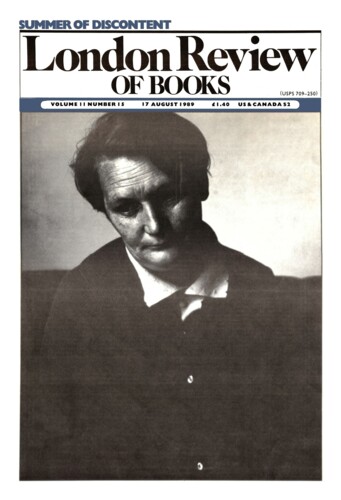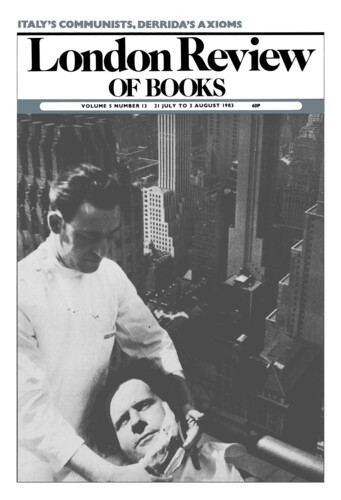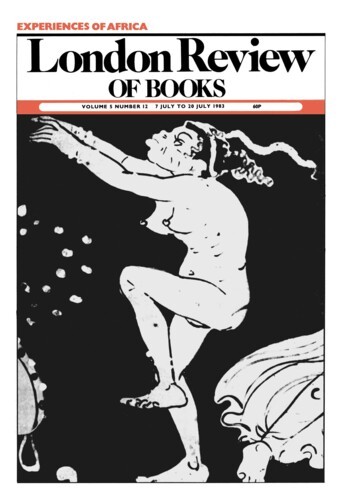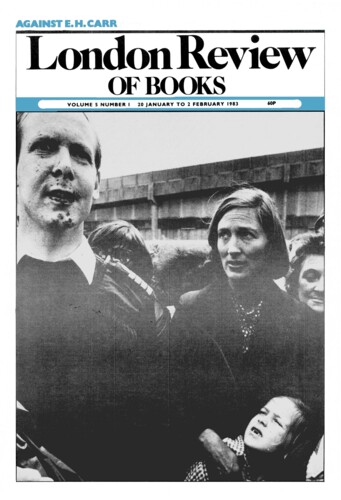Norman Stone
Norman Stone is a fellow of Trinity College, Cambridge, and author of Hitler.
Pastiche
Norman Stone, 21 July 1983
One of Arnold Toynbee’s Laws was that, in any civilisation, mannered imitation of the past was a Bad Thing: he chose the Poles’ decision to reconstruct the Old City of Warsaw after 1945 as an instance, and would have much preferred to see them raze the ruins and build a ‘city of towers’ on modernistic lines. In a similar way, Victor Hugo remarked of the post-Napoleonic Bourbons that ‘nothing is more decrepit than at the moment of its restoration.’ The editors of this volume might agree with such sentiments. Their book contains knowledgeable and entertaining contributions. Hugh Trevor-Roper discusses the origins of Scottish kitsch; David Cannadine the (not at all remote) origins of British royal ritual; other contributions concern British rule in India and Welsh cultural identity (treated more respectfully than Trevor-Roper treats poor old Scotland). Eric Hobsbawm both introduces and concludes the book with essays of great penetration and learning on ‘the invention of tradition’ as a kind of phenomenology of the bourgeois mind.
Statue of Liberty
Norman Stone, 7 July 1983
The Russian gentry of the 19th century produced a strangely long list of ‘names’. Can you imagine the English nobility, in that or any other era, producing Tolstoys or Turgenevs, Mussorgskys or Herzens? The contrast between actual and would-be, in 19th-century Russia, was vast, and was to stimulate literature of a very high order: in this respect, there is a parallel between the Russian case and the Anglo-Irish one, among others. In Italy, Sicily was by far the most backward part: but all the most interesting Italians – and certainly the funniest – came from the South. An upper class looking ‘west’ in a countryside that looked ‘east’ had much to sharpen its sense of irony.–
E.H. Carr
10 January 1983
Grim Eminence
Norman Stone, 10 January 1983
The historian Edward Hallett Carr died on 3 November 1982, at the age of 90. He had an oddly laconic obituary in the Times, which missed out a great deal. If he had died ten years before, his death would probably have been noticed a great deal more, for Carr was an eminent left-wing historian, had a huge record of publication, and had embarked, 35 years before his death, on a History of Soviet Russia which has been described as ‘monumental’ and ‘a classic’. By the time he died, the 15th separate book of this History – The Twilight of the Comintern – was just about to appear, and in his papers there is the larger part of a manuscript for the 16th volume. It may perhaps be edited by Carr’s friend, Tamara Deutscher, with whom he frequently collaborated.
Pieces about Norman Stone in the LRB
Living like a moth
Michael Ignatieff, 19 April 1990
I have always wondered when my grandparents realised they would never see Russia again. In July 1917, when they locked up the house on Fourstatskaya Street in Petrograd, left the key with my
Rules of the Game
Jon Elster, 22 December 1983
Raymond Aron died of a heart attack on 17 October, a few weeks after the publication of his memoirs. He died on the steps of the Paris courthouse where he had been testifying on behalf of his
Before the Fall
Eric Hobsbawm, 21 April 1983
From TV studios to Trinity College, Cambridge, who can resist the historical fascination of the decades before 1914? They are sufficiently ‘contemporary’ for their landscape to be
Hitler and History
Hans Keller, 5 February 1981
My title is intended to be quadruply functional: the four books raise four interpenetrating problems – and not one problem per book either. That Hitler himself remains an incurable problem
Read anywhere with the London Review of Books app, available now from the App Store for Apple devices, Google Play for Android devices and Amazon for your Kindle Fire.
Sign up to our newsletter
For highlights from the latest issue, our archive and the blog, as well as news, events and exclusive promotions.




